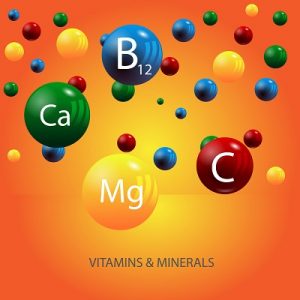 Many people consider vitamin and mineral deficiencies as a thing of the past. Unfortunately, the truth is that the majority of America’s population has a vitamin deficiency of some sort. This is mainly due to poor diet.
Many people consider vitamin and mineral deficiencies as a thing of the past. Unfortunately, the truth is that the majority of America’s population has a vitamin deficiency of some sort. This is mainly due to poor diet.
You may eat well, but there are other factors (such as health conditions and age) that can have an impact on your body’s ability to absorb vitamins in your food.
Vitamin and mineral deficiencies can alter our bodily functions and its processes at the most basic cellular level, including enzyme function, digestion, water balance, new signaling, and metabolism.
It is vital for our body’s function, development, and growth that we resolve these deficiencies immediately.
Vitamin and mineral deficiencies can lead to diseases such as osteoporosis from a lack of vitamin D and calcium. As well as low iron counts leading to anemia, which is a drain on your energy. There are several telltale symptoms related to vitamin deficiency, and in this case seven incredibly common nutrient deficiencies.
Calcium
It maintains strong bones, controlling nerve function and muscles. Signs of calcium deficiency include muscle cramps, poor appetite, fatigue, and abnormal heart rhythms.
The best way to combat a calcium deficiency is by getting three servings of yogurt or milk every day. Other excellent sources of calcium include dark, leafy greens, cheese, and calcium-fortified orange juice. When taking a supplement, choose an algae-based formula that includes vitamin D3 and magnesium.
Vitamin D
A very important vitamin that is critical to both immunity and bone health. Long-term vitamin D deficiency can lead to a softening of bones – but short-term deficiency symptoms include muscle aches, muscle weakness, and fatigue. Also, we tend to get more colds and flu in the wintertime due to the lack of exposure to sunshine.
There are several ways to get the vitamin D your body needs, getting three servings of yogurt or fortified milk every day, and eating fatty fish (like tuna or salmon) twice a week, and taking advantage of sunshine whenever it presents itself.
When taking a supplement, as I do in winter, spring, summer, and fall – get vitamin D3 which is a more asorbible form of the vitamin. Also, in the colder months, I take 5,000 to 10.000 I.U.s, but be careful not to take more than 10,000 I.U.s per day.
Potassium
Potassium works to keep the heart, kidneys, and other organs functioning properly. Short-term potassium deficiencies are common during bouts of vomiting, diarrhea, taking antibiotics, and sweating excessively. More serious potassium deficiencies could be a result of kidney disease or eating disorders.
Symptoms of deficiency include muscle weakness, weight loss, constipation, as well as abnormal heart rhythm in severe cases.
Bananas, milk, whole grains, peas, vegetables, and beans are all excellent, natural sources of potassium.
Iron
When iron levels drop too low your body is unable to carry oxygen effectively, which affects the body’s ability to make red blood cells. Low iron level can lead to anemia, which causes fatigue. If your hair is thin and dull and your skin is pale, then you may be iron deficient.
Try eating lentils, beef, oysters, spinach, iron-fortified cereals, and beans (chickpeas, white beans, and kidney beans) to boost your iron levels.
Vitamin B12
Unfortunately, this is becoming a more common deficiency, with weight loss surgery and veganism growing in popularity. Symptoms include fatigue, anemia, swollen tongue, paranoia, hallucinations, memory loss, balance issues, and numbness in extremities.
Vitamin B12 is available from animal sources including chicken, fish, milk, and yogurt. For vegans, there are meat substitutes, non-dairy milk, and breakfast cereals that are fortified with B12.
Folate
Folic acid is especially important for women in the childbearing age bracket. Prenatal vitamins contain a substantial dose and deficiencies cause decreases in cell numbers, as well as large red blood cells. During pregnancy, this can have an impact on neural tube defects for the unborn.
Folic acid deficiency symptoms include gray hair, mouth ulcers, fatigue, a swollen tongue, and poor growth.
If you’re aiming to get pregnant, or could fall pregnant, you should be taking folate supplements daily. Otherwise, you can get your fix from oranges, lentils, leafy greens, and beans.
Magnesium
Another key aspect for promoting bone health, deficiencies include fatigue, nausea, vomiting, and a loss of appetite. Great sources of magnesium include nuts, edamame, and black beans.
Your best bet to avoid any vitamin and mineral deficiencies is to eat a well-balanced diet and take good quality supplements. Even though mass-produced vegetables and process foods may lack a sufficient amount of vitamins and minerals for optimal health, they do include phyto-chemicals and other nutrients that help your body absorb the nutrients that you do consume.






